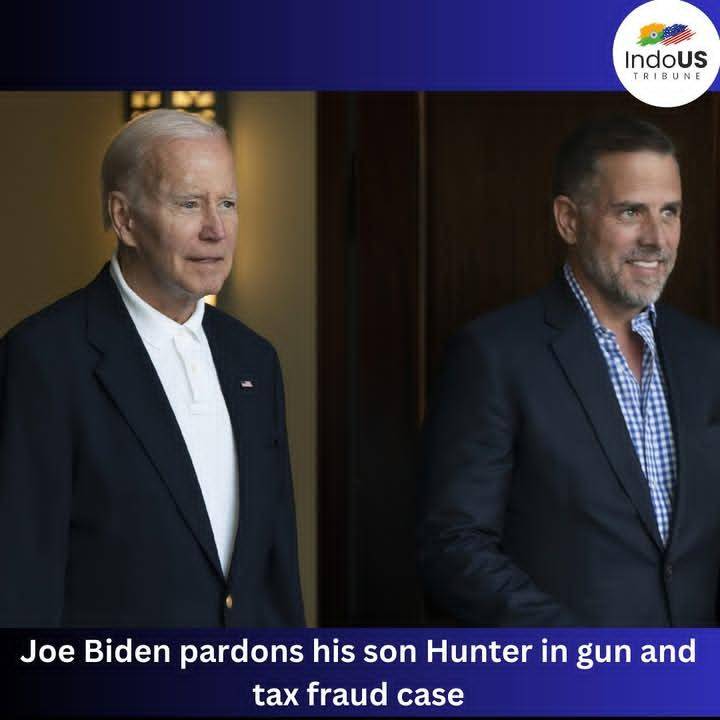Biden’s Pardon of Hunter: A Controversial Decision Divides Lawmakers and Public Opinion.
On Monday, President Joe Biden made the decision to pardon his son, Hunter Biden, for tax and firearm-related convictions. The announcement has sparked a fierce political debate, with criticism coming from both Republican and Democratic lawmakers. This controversial move, while in line with some past presidential actions, has raised questions about the integrity of the justice system and the use of executive power.
A Defense of Hunter Biden’s Legal Troubles.
The Biden administration defended the pardon, arguing that Hunter Biden had been unfairly targeted for political reasons. White House Press Secretary Karine Jean-Pierre explained that the attacks on Hunter were part of a broader effort to undermine the Biden family. “Republicans would continue to go after his son,†Jean-Pierre said during a press briefing, noting that other presidents had pardoned family members. The most notable comparisons came from President Donald Trump, who used his last days in office to pardon political allies, including Charles Kushner, the father of his son-in-law Jared. President Bill Clinton similarly pardoned his half-brother, Roger Clinton, for a drug-related conviction.
Hunter Biden, 54, faced up to 17 years in prison for tax-related crimes and up to 25 years for gun-related charges, though federal sentencing guidelines suggested a lesser sentence. Despite this, Hunter’s legal issues had long been a source of public scrutiny, especially amid allegations of conflicts of interest related to his foreign business dealings during his father's presidency.
Reactions from Both Sides of the Aisle
The pardon has elicited sharp responses from lawmakers across the political spectrum. Republicans have been particularly vocal in their criticism, arguing that the decision undermines trust in the U.S. justice system. House Speaker Mike Johnson called the pardon a “miscarriage of justice,†noting that President Biden had repeatedly stated he would not pardon his son. Republican Congressman Jim Jordan, chair of the House Judiciary Committee, questioned the timing of the pardon, tying it to ongoing impeachment efforts against President Biden. “If there was nothing to our impeachment inquiry, why would President Biden issue a pardon for the very charges we were investigating?†Jordan asked.
Similarly, Representative James Comer, chair of the House Oversight Committee, called the pardon an attempt to shield the Biden family from accountability. He argued that the charges against Hunter Biden were just the “tip of the iceberg†in a broader narrative of corruption.
On the other hand, President Biden has defended his actions, framing the pardon as a necessary step in ensuring his son was not unfairly persecuted. “No reasonable person who looks at the facts of Hunter’s case can conclude that he was not singled out because he is my son,†Biden stated, emphasizing the toll the legal battles had taken on Hunter's life and sobriety.
The Political Implications of the Pardon
The decision to grant Hunter Biden a pardon is likely to remain a flashpoint in American politics. Supporters of the Biden administration argue that the legal system should be free from political influence, while critics see the pardon as a form of cronyism that undermines public faith in the judicial process. This ongoing debate raises important questions about the intersection of power, politics, and justice in the U.S. and whether such executive actions should be subjected to greater scrutiny.
As the public continues to grapple with the implications of this decision, the controversy surrounding Hunter Biden’s pardon is likely to fuel political discourse for months to come. The outcome may have lasting effects on both the Biden administration and the broader political landscape as voters and lawmakers alike assess the boundaries of presidential pardon power.
By addressing both the facts and the varied responses surrounding the pardon, this blog offers readers an informative perspective on the complex political and legal issues at play. With balanced coverage and relevant historical context, this post aims to engage readers and encourage further conversation on a topic that remains deeply divisive in American politics.


